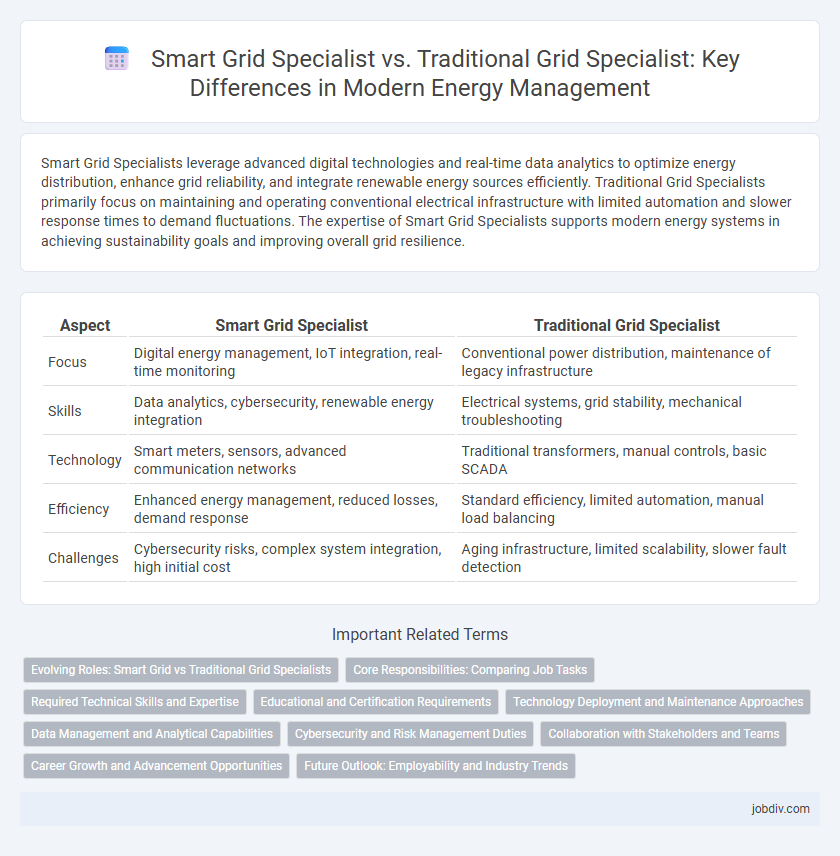Smart Grid Specialists leverage advanced digital technologies and real-time data analytics to optimize energy distribution, enhance grid reliability, and integrate renewable energy sources efficiently. Traditional Grid Specialists primarily focus on maintaining and operating conventional electrical infrastructure with limited automation and slower response times to demand fluctuations. The expertise of Smart Grid Specialists supports modern energy systems in achieving sustainability goals and improving overall grid resilience.
Table of Comparison
| Aspect | Smart Grid Specialist | Traditional Grid Specialist |
|---|---|---|
| Focus | Digital energy management, IoT integration, real-time monitoring | Conventional power distribution, maintenance of legacy infrastructure |
| Skills | Data analytics, cybersecurity, renewable energy integration | Electrical systems, grid stability, mechanical troubleshooting |
| Technology | Smart meters, sensors, advanced communication networks | Traditional transformers, manual controls, basic SCADA |
| Efficiency | Enhanced energy management, reduced losses, demand response | Standard efficiency, limited automation, manual load balancing |
| Challenges | Cybersecurity risks, complex system integration, high initial cost | Aging infrastructure, limited scalability, slower fault detection |
Evolving Roles: Smart Grid vs Traditional Grid Specialists
Smart Grid Specialists leverage advanced technologies such as IoT, AI, and real-time data analytics to enhance grid reliability, efficiency, and renewable energy integration, distinguishing their skill set from Traditional Grid Specialists who primarily focus on maintaining and operating conventional electrical infrastructure. The evolving energy landscape demands Smart Grid experts who can manage decentralized energy resources, optimize demand response, and ensure cyber-physical security. This shift highlights the growing importance of digital proficiency and systems thinking in modern grid management versus the traditional emphasis on mechanical and electrical maintenance.
Core Responsibilities: Comparing Job Tasks
Smart Grid Specialists primarily focus on integrating advanced technologies such as IoT sensors, AI-driven analytics, and real-time data management to optimize energy distribution and enhance grid resilience. Traditional Grid Specialists concentrate on maintaining and troubleshooting physical infrastructure like transformers, substations, and transmission lines to ensure consistent power delivery. The evolving role of Smart Grid Specialists demands expertise in software platforms and cybersecurity, contrasting with the mechanical and electrical emphasis found in Traditional Grid Specialist tasks.
Required Technical Skills and Expertise
Smart Grid Specialists need advanced skills in digital communication protocols, cybersecurity, and data analytics to manage interconnected, real-time energy systems efficiently. Traditional Grid Specialists focus on electrical engineering principles, high-voltage equipment maintenance, and manual grid operation techniques. Expertise in IoT devices, renewable energy integration, and software-driven grid management distinguishes Smart Grid Specialists from their traditional counterparts.
Educational and Certification Requirements
Smart Grid Specialists typically require advanced education in electrical engineering, computer science, or energy systems, emphasizing smart technologies, IoT integration, and data analytics. Certification programs such as the Certified Energy Manager (CEM) or Smart Grid Professional (SGP) credential enhance expertise in modern grid operations and cyber-physical systems. Traditional Grid Specialists often hold degrees in electrical engineering with certifications like the Professional Engineer (PE) license, focusing on legacy grid infrastructure and conventional power distribution methodologies.
Technology Deployment and Maintenance Approaches
A Smart Grid Specialist leverages advanced technologies such as IoT sensors, real-time data analytics, and automated control systems to optimize energy distribution and enhance grid resilience. In contrast, a Traditional Grid Specialist relies on manual inspections, fixed equipment, and reactive maintenance protocols that lack real-time adaptability. The deployment approach for smart grids prioritizes integration of renewable energy sources and cybersecurity measures, whereas traditional grids focus on established infrastructure stability and routine preventive maintenance.
Data Management and Analytical Capabilities
Smart Grid Specialists excel in advanced data management by leveraging real-time analytics, big data integration, and AI-driven predictive maintenance, enabling more efficient energy distribution and fault detection. Traditional Grid Specialists primarily rely on historical data and manual analysis, which limits the responsiveness and scalability of grid operations. Enhanced analytical capabilities in smart grids facilitate dynamic load balancing and rapid decision-making, significantly improving grid reliability and sustainability.
Cybersecurity and Risk Management Duties
Smart Grid Specialists implement advanced cybersecurity protocols to protect interconnected digital systems from cyber threats, ensuring real-time risk assessment and rapid response capabilities. Traditional Grid Specialists focus on physical security measures and compliance with legacy risk management frameworks, often lacking integration with modern threat intelligence tools. The evolving complexity of smart grids demands specialists skilled in blockchain, AI-driven anomaly detection, and encryption methods to mitigate cyber vulnerabilities effectively.
Collaboration with Stakeholders and Teams
Smart Grid Specialists excel in collaboration by integrating advanced communication technologies, enabling real-time data sharing and coordination among utility companies, regulators, and consumers. Traditional Grid Specialists typically focus on established protocols, working within fixed infrastructures that limit dynamic interaction with diverse stakeholders. The presence of IoT devices and AI in smart grids fosters a more adaptive and cooperative environment for specialists compared to the conventional grid systems.
Career Growth and Advancement Opportunities
Smart Grid Specialists experience faster career growth due to the rising demand for advanced grid technologies, including IoT integration and real-time data analytics. Traditional Grid Specialists, while essential for maintaining legacy infrastructure, face limited advancement opportunities as the energy sector shifts toward modernization and digitalization. Expertise in smart grid systems, cybersecurity, and renewable energy integration significantly enhances career advancement prospects in the evolving energy industry.
Future Outlook: Employability and Industry Trends
Smart Grid Specialists are increasingly in demand due to the global shift towards renewable energy integration, grid decentralization, and advanced digital technologies such as IoT and AI-driven analytics. Traditional Grid Specialists still play a crucial role in maintaining legacy infrastructure, but their employability is expected to decline as utilities prioritize smart grid modernization and resilience. Industry trends highlight a growing emphasis on cybersecurity, real-time data management, and intelligent energy distribution, making expertise in smart grid systems essential for future job opportunities.
Smart Grid Specialist vs Traditional Grid Specialist Infographic

 jobdiv.com
jobdiv.com